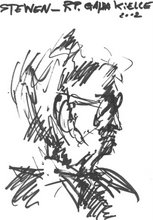
I must immediately admit that I quickly learnt how culturally dependent my tastes are when I started watching Polish films. I had high hopes that I would find something different and refreshing, something uniquely Polish, but instead they are normally dull and predictable. Each to his own, of course. (Actually, I blame Łodż, but that's a different story.)
33 Scenes struck my early as a Polish version of a Woody Allen family and friends film. If you like Woody Allen, take that as recommendation in itself. If you don't, the characters are much different in this film: rawer, releasing their emotions rather than overcoming their repressions. Better, for me.
The film is about reactions to the death of parents: feelings during a protracted dying period, at the time of death and after. Both individual emotions and family tensions come across sensitively and, for me, largely realistically. There is some real humour within this, both as release from the tension by the characters themselves and in the situations. (Sex as well, of course.) Although I cannot claim that it kept me riveted to my seat, it was good enough to make me keep an ear out to hear what was happening - an achievement in itself for a non-action, domestic-plot film where you don't need to watch to know what is happening.
Although I knew the name of the film from TV promotion when it was released, I didn't know anything about its content. Reading the box afterwards, I found that a Polish critic felt that the film broke all Polish taboos. Not having been forewarned, I can only guess that this particularly relates to people not being extremely sad and silently respectful when a close family member has died. However, I do wonder how much this is a real Polish taboo, rather than related to the repressed nature of Polish film making. Indeed, the film funeral scene was amazingly similar to my being to the rear of a funeral procession walking through a cemetery, listening to the irreverent and irrelevant chatter, even including an identical "aren't they going the wrong way?". The emotion of the direct household were much different, but the film didn't have people pushing and shoving to get to see the coffin in the grave.
The DVD cover gave an alternative German perspective of the film, but decide for yourself whether you would want to read about it beforehand. I only thought it explained what had appeared to be a rather cliched and out-of character scene in the film, but I see where it's coming from.
One thing that particularity impressed me, however, was an actor who played a strong, quiet, sensitive man. I couldn't remember seeing him before, but it was one of the best performances I have seen in Polish films or on TV. I was told he might be German, however. There was also a scene where one of the actresses convincingly laughed strongly and loudly. Its weird that something so minor should impress me, but its not normal for Polish acting. She might also be German. More Polish-German collaborations, please. On the other hand, the film also has a known Polish actor (male) who always comes across to me as being feminine gay, which may have completely subverted some of the dramatic intention of the plot.
Apart from the content of the film, the DVD has a severe technical problem. It breaks up the spoken scenes with musical inserts. On our system, this was so loud that we had to turn the volume down - it was uncomfortable to listen to: fortunately we don't live in a flat. It may be OK in the cinema or just listening through TV speakers. The idea behind the contrast is good, but having to grab the remote spoils it. The music itself is actually much better than the normal formulaic orchestral (we know the right emotional harmonics), sentimental music, but it's imperfections are all to obvious when blasted down your ears.
Ultimately, although I cannot urge you to rush out and buy the DVD, it is worth watching if you have the chance. It's a step on the way to future quality Polish films, even if it doesn't quite make it all the way up the ladder itself. If it really is breaking Polish film taboos, a few more attempts would be worth the effort. Hopefully there will soon be the time when "acutely observed" will be a better description.


No comments:
Post a Comment